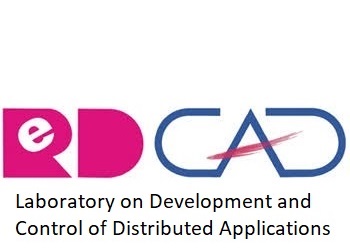
News:
- The deadline for submitting the camera Ready version is: September 15, 2016.
- The list of accepted papers is now available online here.
- The list of program committee members is online.
- ASOCA 2016 will take place on October 10, 2016.
The workshop address the adaptation and reconfiguration issues of the Service-oriented and cloud applications and architectures.
The concept of adaptive and reconfigurable SOA has been introduced in order to describe architectures, which exhibit functional and non-functional properties. An adaptive and reconfigurable SOA can repair itself if any execution problems occur, in order to successfully complete its own execution, while respecting functional and NF agreements. In the design of an adaptive and reconfigurable software system, several aspects have to be considered. For instance, the system should be able to predict or to detect degradations and failures as soon as possible and to enact suitable recovery actions. Moreover, different NF requirements service levels might be considered in order to complete the execution in case of failure. Contributions are devoted to the design and the implementation of adaptive and reconfigurable service oriented and cloud applications and architectures.
TopicsContributions are devoted to adaptability and reconfiguration management in service-oriented and cloud application. Specifically, the relevant topics include, but are not limited to:
- Distributed and centralized solutions for the diagnosis and repair of service-oriented and cloud applications.
- Design for the diagnosability and repairability
- Monitoring simple and composite architectures, components and services
- Semantic (or analytic) architectural and behavioral models for monitoring of software systems
- Dynamic reconfiguration of of service-oriented and cloud applications.
- Planning and decision making
- Technologies for ensuring autonomic properties
- Predictive management of adaptability.
- Management of autonomic properties
- Experiences in practical adaptive and reconfigurable service-oriented and cloud applications.
- Tools and prototypes for managing adaptability.
- Submission Deadline: July 24, 2016
- Notification: August 14, 2016
- Camera Ready Copy Due: September 15, 2016
- Workshop: October 10, 2016
- Antonio Bucchiarone, Martina De Sanctis and Annapaola Marconi.
Decentralized Dynamic Adaptation for Service-based Collective AdaptiveSystems - Antoine Auger, Ernesto Exposito and Emmanuel Lochin.
A generic framework for quality-based autonomic adaptation within sensorbasedsystems - Hela Malouche, Youssef Ben Halima and Henda Hajjami Ben Ghezala.
A brokerage architecture: cloud service selection - Rima Grati, Khouloud Boukadi and Hanene Ben-Abdallah.
Business Adaptation For BPaaS using Fuzzy Logic Systems - Yataghene Lydia.
Using Formal model for Evaluation of Business Processes Elasticity in theCloud
If any problem arises when submitting your paper, please contact: slim.kallel@fsegs.rnu.tn
Each paper will be reviewed by at least three members of the international program committee for ensuring high quality.
Paper acceptance will be based on originality, significance, technical soundness, and clarity of presentation. All accepted papers will be included in the workshop proceedings published as part of the Lecture Notes in Computer Science (LNCS) series of Springer.
At least one author of an accepted paper must register and participate in the workshop. Registration is subject to the terms, conditions and procedure of the main ICSOC conference to be found on their website: http://www.icsoc.org/
| Mohamed Jmaiel | CRNS, Sfax, Tunisia |
| Slim Kallel | ReDCAD, University of Sfax, Tunisia |
| Ismael Bouassida Rodriguez | LAAS-CNRS and Université de Toulouse, France |
Web and publicity chair
| Emna Feki | ReDCAD, FSEGS, University of Sfax, Tunisia |
Program Committee (pending)
| Djamal Benslimane | Lyon 1 University, France |
| Isabelle Borne | Université de Bretagne Sud, France |
| Cinzia Cappiello | Politecnico di Milano, Italy |
| Anis Charfi | Carnegie Mellon University, Qatar |
| Carlos E. Cuesta | Rey Juan Carlos University, Spain |
| Marcos Da Silveira | CRP Henri Tudor, Luxembourg |
| Flavia Delicato | Federal University of Rio de Janeiro (UFRJ), Brazil |
| Mohammed Erradi | Ensias, Marocco |
| Nikolaos Georgantas | INRIA, France |
| Ian Gorton | Carnegie Mellon University, USA |
| Volker Gruhn | Universität Duisburg-Essen, Germany |
| Dimka Karastoyanova | University of Stuttgart, Germany |
| José Carlos Maldonado | ICMC-USP, Brazil |
| Mohamed Mosbah | LaBRI - University of Bordeaux, France |
| Elisa Yumi Nakagawa | University of Sao Paulo, Brazil |
| Mourad Oussalah | LINA Laboratory, University of Nantes, France |
| Ilia Petrov | TU Darmstadt, Germany |
| Claudia Raibulet | University of Milano-Bicocca, Italy |
| Philippe Roose | Université de Pau et des Pays de l'Adour |
| Cecilia Rubira | Institute of Computing, UNICAMP, Brazil |
| Salah Sadou | IRISA, University of South Brittany, France |
| Mohamed Sellami | Ecole des Mines, Nantes, France |
| Uwe Zdun | University of Vienna, Austria |

Laboratory on Development and Control of Distributed Applications